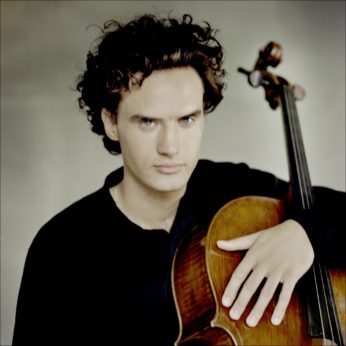Composer: Pyotr Ilyich Tchaikovsky (b. 1840 - d. 1893)
Performance date: 26/06/2010
Venue: Bantry Library
Composition Year: 1881-2
Duration: 00:46:16
Recording Engineer: Anton Timoney, RTÉ lyric fm
Instrumentation: vn, pf
Instrumentation Category:Piano Trio
Artists:
Alexei Grynyuk -
[piano]
Leonard Elschenbroich -
[cello]
Nicola Benedetti -
[violin]

Tchaikovsky wrote this overwhelming Trio in memory of his old friend and
mentor, Nikolai Rubinstein, who had died suddenly at a young age. Rubinstein
had been Director of the Moscow Conservatoire as well as a famous pianist and
composer and had been a major force in Russian musical life.
Elegiac
works in the Russian tradition tend to be massive and this one is no exception.
We are immediately struck by the breath-taking lyricism of the main theme that
the cello announces before passing it to the violin and eventually the piano.
The second theme is a complete contrast, Russian in style and in the nature of
a triumphant song celebrating Rubinstein’s remarkable achievements, which is
then given an elaborate and lengthy working out, leading eventually to a
beautiful new idea that flows from the violin through the trio. Happy memories
are eventually put aside at the solemn return of the opening theme, which is
built up into a long elegiac peroration befitting such a vital figure in
Russian music.
A second instantly memorable theme opens the mighty set
of variations that makes up the second movement. The variations are thought to
recall Rubinstein’s personality and incidents in his long friendship with
Tchaikovsky. The theme is announced first on the piano and then picked up
unaltered by the violin before it is slipped into ¾ time and mazurka-style. The
third variation is a miniature scherzo starring the piano with unusual comments
from the strings. This is followed by a leisurely and expansive Russian dance
based on the second part of the theme, while the fifth variation features the
piano in delicate music-box style. Next comes a dainty waltz that is gratefully
allowed to spread out into one of the longest variations. Number seven sees the
theme in the piano in broad chords while the strings answer in their own style.
Next is a delightful fugue, vigorous and full of fun, dancing and laughing all
at once. The ninth reverts to a muted and mournful style, whereas in the
mazurka tenth Tchaikovsky once more pays tribute to Rubinstein’s pianism
leading directly into the violin bringing back the original theme.
The
Finale opens with a burst of long-repressed energy that flares up dramatically,
collecting a version of the variations theme in its tumultuous path and
triumphantly celebrating Rubinstein’s life before recalling the elegiac theme
of the opening movement. This is the signal for an evocative and impressive
funeral march that sinks finally into an appalled coda.
Copyright © 2024 West Cork Music. All rights reserved.
Designed and developed by Matrix Internet